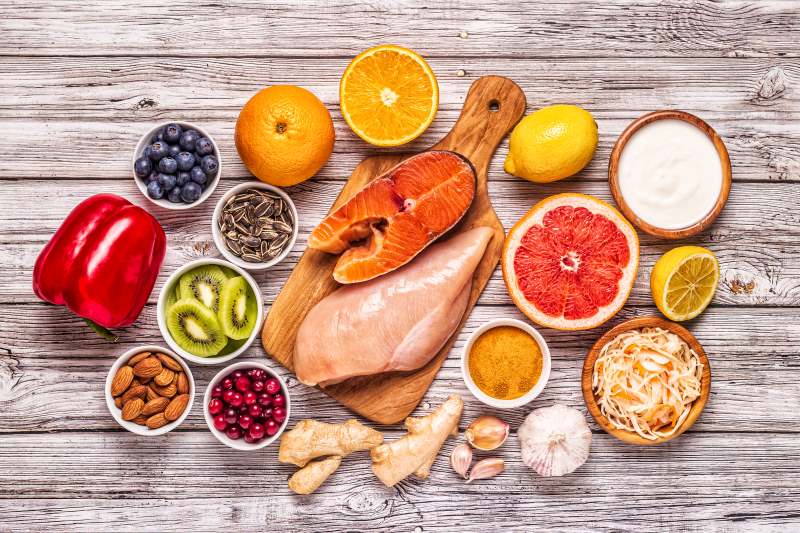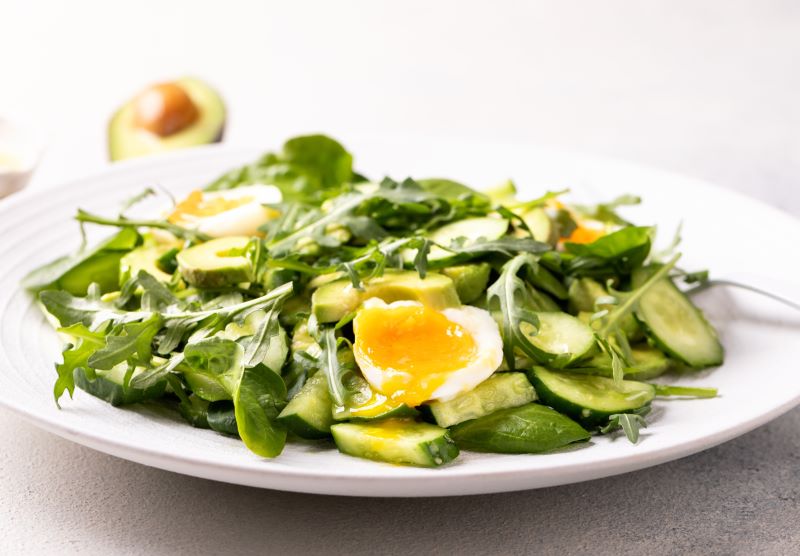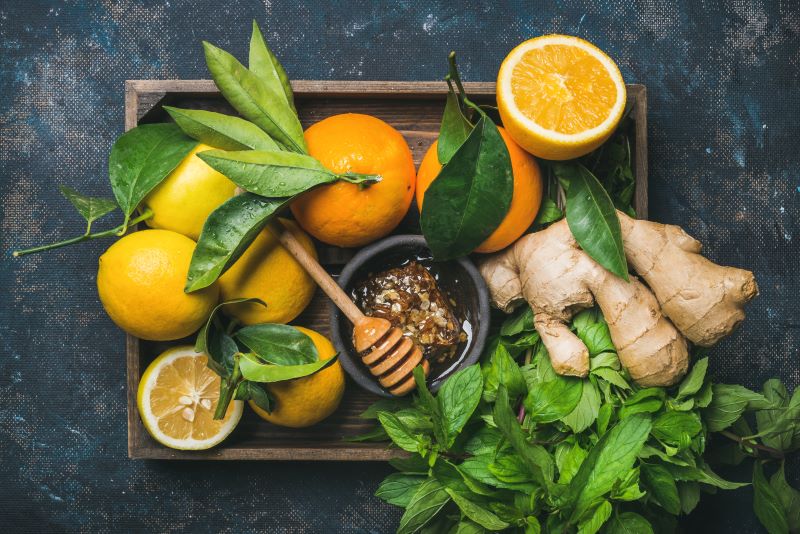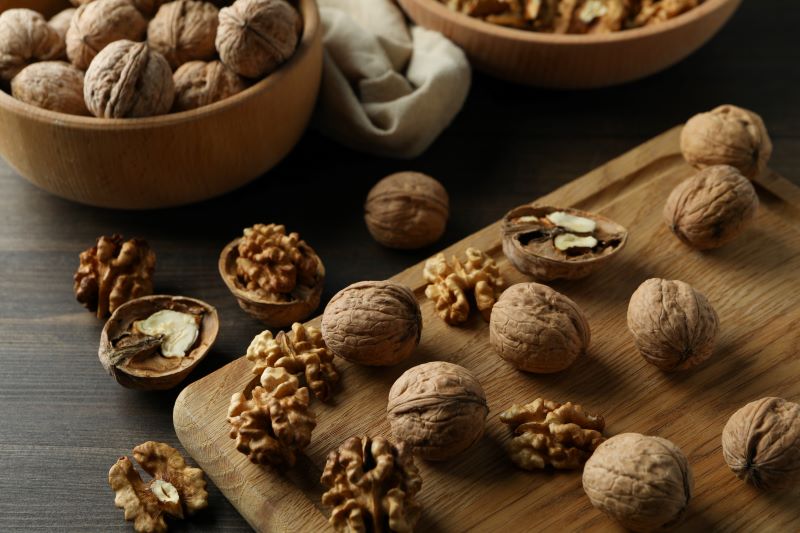43 Immunity-Rich Foods, Fruits & Vegetables to Include in Your Diet

Boosting immunity is the basic principle of health and the crucial healing factor. Integrating the immunity powerhouse in your diet can protect your body from infectious diseases.
These compounds are believed to protect against microorganisms such as viruses and bacteria, strengthening the immune system. Immunity-rich food comes from the citrus fruits family, such as oranges, lemons, and kiwis.
Moreover, a diet rich in zinc, selenium, vitamin C, vitamin D and probiotics will fight against non-infectious and infectious diseases. The presence of these foods in an individual's diet boosts immunity.

Table of Contents

What is Immunity?
Immunity is the body's defence against harmful pathogens and diseases. It involves a complex network of cells, tissues, and organs. White blood cells play a crucial role in immune responses. They identify and eliminate invading pathogens like bacteria and viruses. The immune system also remembers past encounters with pathogens.
This memory allows for faster and more effective responses to reinfection. Various factors influence immunity, including genetics, nutrition, and lifestyle. A balanced diet rich in vitamins and minerals supports immunity. Regular exercise and adequate sleep also boost immune function.
What are the Sources of Immunity?
Immunity is fortified through various natural sources and lifestyle habits. A balanced diet rich in fruits, vegetables, and whole grains. Regular exercise strengthens the immune system and reduces inflammation. Adequate sleep supports immune function and promotes overall well-being.
Hydration with water and herbal teas maintains optimal bodily functions. Limiting alcohol intake and avoiding smoking protect immune health. Regular handwashing and hygiene practices prevent infections and bolster immunity.
Top 43 Food Items High in Immunity
A healthy immune system is based on diet foods that add a variety of nutrients as much as possible. The number one attribute is Vitamin C in various citrus fruits like oranges and grapefruits. This is renowned for its role in supporting immune function.
This helps improve one's immune system and heal wounds faster. You can glance at the list of food items containing Immunity and incorporate these into your diet.
List of Immunity-Rich Vegetables

Having vegetables mixed in the diet is important for giving the immune support system a good boost. A diverse array of vegetables can boost your immune system.
SNo. |
Vegetable | Description |
| 1 | Spinach | Loaded with vitamins A, C, and E, as well as antioxidants and iron, spinach supports immune function and overall health. |
| 2 | Broccoli | Rich in vitamins A, C, and E, along with antioxidants and fibre, broccoli aids in immune defence and promotes a healthy gut. |
| 3 | Bell Peppers | High in vitamin C and antioxidants, bell peppers help strengthen the immune system and protect against infections. |
| 4 | Kale | Packed with vitamins A, C, and K, as well as antioxidants, kale boosts immunity and provides essential nutrients for optimal health. |
| 5 | Brussels Sprouts | Rich in vitamins C and K, as well as antioxidants and fibre. Brussels sprouts support immune function and contribute to overall well-being. |
| 6 | Carrots | With beta-carotene, vitamins A and C, and antioxidants, carrots enhance immune function and promote healthy skin and vision. |
| 7 | Sweet Potatoes | High in beta-carotene, vitamins A and C, and antioxidants, sweet potatoes support immune health and contribute to overall wellness. |
| 8 | Cauliflower | Rich in vitamins C and K, as well as antioxidants and fibre. Cauliflower aids in immune defence and provides essential nutrients for optimal health. |
| 9 | Garlic | Known for its antimicrobial properties, garlic contains compounds that support immune function and help fight infections. |
| 10 | Ginger | With anti-inflammatory and antioxidant properties, ginger boosts immune function and aids in digestion, promoting overall health. |
| 11 | Turmeric | Curcumin, the active compound in turmeric, possesses potent anti-inflammatory and antioxidant properties, enhancing immune function and overall well-being. |
List of Fruits Rich in Immunity

Fruits provide essential vitamins, minerals, and antioxidants for immune support. Consuming these fruits regularly can strengthen your body's defence mechanisms.
SNo. |
Fruit | Description |
| 12 | Oranges | Oranges are rich in vitamin C, which boosts the production of white blood cells, enhancing immunity. |
| 13 | Kiwi | Kiwi is packed with vitamin C, vitamin K, and antioxidants, aiding in strengthening the immune system. |
| 14 | Strawberries | Strawberries contain high levels of vitamin C and antioxidants, contributing to a robust immune response. |
| 15 | Blueberries | Blueberries are rich in antioxidants and flavonoids, supporting the immune system's defence against pathogens. |
| 16 | Papaya | Papaya is loaded with vitamin C, vitamin A, and enzymes like papain, which bolster immune function. |
| 17 | Guava | Guava is packed with vitamin C, fibre, and antioxidants, helping to enhance overall immunity. |
| 18 | Pineapple | Pineapple contains bromelain, an enzyme with anti-inflammatory properties that can support immune health. |
| 19 | Mango | Mangoes are rich in vitamins A and C, along with antioxidants, contributing to a strong immune system. |
| 20 | Watermelon | Watermelon is high in vitamin C and lycopene, which may help support the body's natural defences. |
| 21 | Pomegranate | Pomegranates are packed with antioxidants, particularly punicalagin and anthocyanins, which boost immunity. |
List of Cereals and Dairy Products Having Immunity

Many cereals and dairy products are fortified to enhance immunity. Some cereals are enriched with vitamins and minerals for immunity.
SNo. |
Food | Description |
| 22 | Yoghurt | Rich in probiotics that support gut health, a key component of immune function. |
| 23 | Cheese | Contains zinc and vitamin B12, essential nutrients for maintaining a strong immune system. |
| 24 | Milk | Excellent source of vitamin D, crucial for immune regulation and overall health. |
| 25 | Whole Grain Cereals | Packed with fibre, vitamins, and minerals that support overall immune health. |
| 26 | Fortified Cereal | Enriched with vitamins and minerals like zinc and iron, crucial for immune function |
List of Seeds and Nuts Rich in Immunity

This helps our bodies to better resist and fight against diseases. Hence their immune system will get a boost as they are filled with a wide range of benefits.
SNo. |
Seed/Nut | Description |
| 27 | Almonds | Packed with vitamin E, almonds help strengthen the immune system. |
| 28 | Walnuts | Rich in omega-3 fatty acids, walnuts support immune function. |
| 29 | Pumpkin seeds | High in zinc, pumpkin seeds help regulate immune responses. |
| 30 | Sunflower seeds | Loaded with vitamin E and selenium, sunflower seeds boost immunity. |
| 31 | Flaxseeds | Rich in omega-3 fatty acids, flaxseeds aid immune system function. |
| 32 | Chia seeds | Packed with antioxidants, chia seeds support overall immunity. |
| 33 | Sesame seeds | Sesame seeds are a good source of zinc, crucial for immune health. |
| 34 | Brazil nuts | High in selenium, Brazil nuts support a healthy immune system. |
| 35 | Cashews | Cashews contain zinc, supporting the body's immune response. |
| 36 | Pistachios | Pistachios provide B vitamins and antioxidants for immune support. |
List of Animals and Seafood High in Immunity

Eating meat and seafood and seeking out its nutrients will boost your immune system. These plants are protein-rich, with vitamins and minerals, and their role is to function for immunity.
SNo. |
Food | Description |
| 37 | Salmon | Rich in omega-3 fatty acids and vitamin D. It supports immune function and reduces inflammation. |
| 38 | Chicken Breast | High in protein and selenium, essential for immune cell production and function. |
| 39 | Turkey | Contains zinc and B vitamins, which are crucial for immune system regulation and function. |
| 40 | Beef | Rich in iron and zinc, it supports immune cell development and enhances immune response. |
| 41 | Eggs | Provides high-quality protein and vitamin D, which are important for immune system modulation. |
| 42 | Shrimp | Low in fat and high in protein, it contains antioxidants like selenium, supporting immune health. |
| 43 | Crab | Rich in protein and selenium, boosts immune function and promotes tissue repair. |
Calculate Your Health Metrics Instantly
Health Benefits of Immunity-Rich Foods
Incorporating immunity-rich foods significantly enhances overall health and well-being. These foods bolster the immune system, protecting against illnesses. The antioxidants in these foods combat oxidative stress and free radicals. They support the body's defence mechanisms, improving disease resistance.
Regular consumption reduces the frequency and severity of common ailments. Nutrients like vitamins C, D, and zinc strengthen immune responses. Overall, immunity-rich foods are essential for optimal health maintenance.
- Enhanced Immune: Enhanced immune function combats infections, viruses, and diseases effectively. Strong immunity ensures quicker recovery and overall health resilience. The optimal immune response depends on balanced nutrition and a healthy lifestyle.
- Reduced Risk of Illness: Healthy lifestyle choices significantly lower susceptibility to various illnesses. Regular exercise, a balanced diet, and sufficient sleep bolster immune function. Stress management techniques further reduce the risk of falling ill.
- Faster Recovery: Proper rest, hydration, and nutrition accelerate the recovery process. Regular exercise can also promote faster healing and recovery. Seeking medical advice ensures appropriate treatment for speedy recovery.
- Improved Gut Health: Enhanced gut health boosts digestion, immunity, and overall well-being. Probiotics and fibre-rich foods promote a diverse gut microbiome. Healthy gut flora reduces inflammation and supports nutrient absorption.
- Antioxidant Protection: Antioxidants shield cells from damage caused by harmful free radicals. They promote overall health by reducing inflammation and oxidative stress. Foods rich in antioxidants include berries, nuts, and leafy greens.
- Better Nutrient Absorption: Optimise nutrient absorption by consuming diverse, nutrient-rich foods regularly. Include sources of healthy fats to aid fat-soluble vitamin absorption. Pair iron-rich foods with vitamin C sources for enhanced absorption.
- Balanced Inflammation: Maintaining balanced inflammation is crucial for overall health and wellness. Chronic inflammation leads to various health issues, while acute inflammation is necessary for healing. Proper lifestyle choices and diet contribute to balanced inflammatory responses.
- Enhanced Energy Levels: Improved energy levels lead to increased productivity and better focus. Regular exercise and balanced nutrition contribute to sustained energy levels. Adequate sleep and hydration also play key roles in energy enhancement.
- Long-Term Health Benefits: Long-term health benefits include reduced disease risk and improved longevity. Regular exercise promotes cardiovascular health, bone density, and mental well-being. A balanced diet supports weight management, immunity, and overall vitality.
- Overall Well-Being: For robust immunity, prioritise sleep, exercise, and stress management. A nutritious diet rich in fruits, vegetables, and whole grains is essential. A balanced lifestyle supports immune function, ensuring overall well-being and health.
Consulting a healthcare provider can help determine the most appropriate approach for optimal immune support.
Different Ways to Include Immunity-Rich Foods in Your Diet
Incorporate immunity-rich foods into meals, snacks, and beverages daily. Here are different ways to include immunity-rich foods in your diet:
- Smoothies and Juices: Smoothies and juices packed with immune-boosting ingredients enhance wellness. Incorporate fruits rich in vitamin C and antioxidants for immunity. Include leafy greens and ginger for added immune support.
- Salads and Bowls: Nutrient-packed salads and bowls bolster immunity and overall health. For optimal benefits, incorporate colourful vegetables, fruits, and lean proteins. These meals provide essential vitamins and antioxidants for immune support.
- Soups and Stews: Nourishing soups and stews bolster immunity with nutrient-rich ingredients. Broths infused with vegetables and herbs provide essential vitamins and minerals. Homemade recipes often feature garlic, ginger, and turmeric for immunity.
- Snack Packs: Immunity-boosting snack packs offer convenient, nutritious options for health-conscious individuals. Packed with vitamins, antioxidants, and probiotics, they support immune function. These snacks include nuts, fruits, yoghurt, and seeds for variety.
- Herbal Teas and Infusions: Herbal teas and infusions boost immunity naturally with antioxidants and nutrients. Ingredients like echinacea, elderberry, and ginger offer immune support. Regular consumption aids in warding off infections and enhancing well-being.
What are the Symptoms of Immunity Deficiency?
Frequent infections, like colds, could signal compromised immunity. Persistent fatigue and slow wound healing may indicate immune deficiency. Recurrent illnesses and susceptibility to infections are common signs.
- Frequent Infections: Frequent infections indicate a weakened immune system and require attention. Address deficiencies, eat nutrient-rich foods, and maintain healthy lifestyle habits. Consult a healthcare professional for personalised advice and treatment options.
- Slow Wound Healing: Slow wound healing indicates compromised immunity, requiring attention and care. Immune system weakness prolongs recovery, making wounds prone to infection. Boosting immunity with proper nutrition and supplements can expedite healing.
- Chronic Fatigue: Chronic fatigue weakens the immune system, increasing susceptibility to illnesses. Lack of energy impairs the body's ability to fight infections effectively. Restorative sleep and a balanced diet are crucial for boosting immunity.
- Digestive Issues: A healthy digestive system is crucial for robust immunity defences. Imbalanced gut flora can weaken immune responses and increase susceptibility. Addressing digestive issues improves nutrient absorption and enhances overall immunity.
- Autoimmune Disorders: Autoimmune disorders occur when the immune system attacks healthy cells. This can lead to inflammation, tissue damage, and chronic health issues. Managing these conditions often involves medication and lifestyle adjustments.
- Allergic Reaction: Allergic reactions weaken the immune system, triggering inflammation and hypersensitivity. They compromise the body's defence, making it prone to infections. Immune response misfires, causing symptoms like itching, swelling, and rashes.
- Recurrent Oral Thrush: Recurrent oral thrush may indicate compromised immune function. Immunity-boosting foods aid in preventing frequent thrush outbreaks. Nutrients like zinc and vitamins support immune responses against infections.
What are the Health Risks of Not Having a Strong Immune System?
Insufficient immunity increases susceptibility to various infections and illnesses. Weak defence mechanisms may result in prolonged recovery periods. Here are some common health risks:
Chronic illnesses like autoimmune diseases may worsen without immunity.
Recovery from illnesses may take longer or be incomplete.
The risk of severe complications from common infections escalates.
Susceptibility to contagious diseases rises, endangering community health.
Reduced ability to fight off pathogens weakens overall health.
Increased risk of contracting potentially life-threatening illnesses emerges.
Immune system disorders may develop, causing chronic health issues.
Impact on mental health due to frequent illness and debilitation.
Higher healthcare costs due to increased medical interventions and treatments.
What are the Side Effects of Excessive Immunity Intake?
Excessive immunity intake can lead to adverse health effects. Overconsumption may disrupt immune system balance, causing autoimmune reactions. High doses of certain vitamins can lead to toxicity symptoms.
Increased susceptibility to infections from immune system suppression.
Allergic reactions escalate with heightened immune activity.
Chronic inflammation leads to tissue damage and organ dysfunction.
Potential for development of drug resistance against immunity boosters.
Disruption of normal immune system balance, causing dysregulation.
Exacerbation of existing health conditions due to immune overdrive.
Overproduction of antibodies may trigger hypersensitivity reactions.
Elevated risk of inflammatory diseases like arthritis and asthma.
Possible adverse effects on fertility and reproductive health.
Secure Your Health with These Plans
Should You Take an Immunity Supplement?
Deciding whether to take an immunity supplement depends on factors. Assess your overall health and dietary habits. Consult a healthcare professional for personalised advice. Supplements may complement a balanced diet lacking in nutrients.
Consider your specific health concerns and goals carefully. Some individuals may benefit from targeted supplementation for immunity support. However, whole foods should be prioritised for essential nutrients and antioxidants.
Supplements aren't a substitute for a healthy lifestyle. Maintain regular exercise, sufficient sleep, and stress management practices. Ultimately, make informed decisions based on individual needs and circumstances.
Consuming immunity-rich foods is paramount for maintaining optimal health. These foods are abundant in nutrients that support the immune system's function. They include fruits, vegetables, and dairy products that are fortified with essential vitamins and minerals. Foods high in immunity in your diet can help prevent illnesses and support faster recovery from infections.










